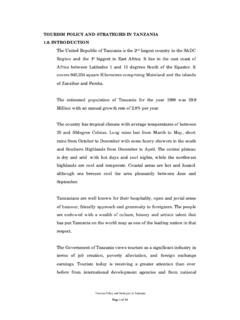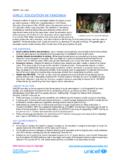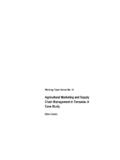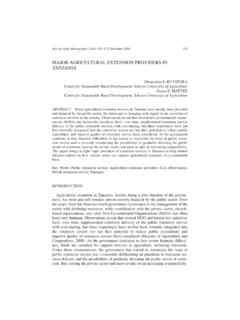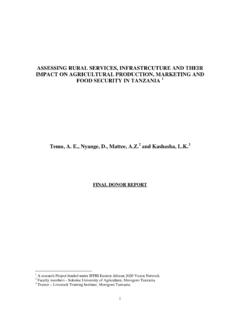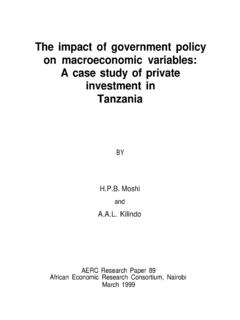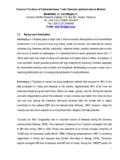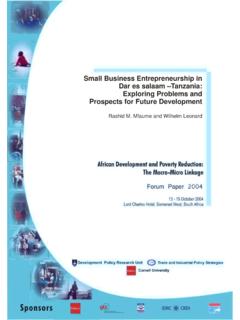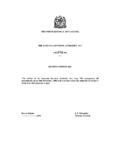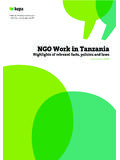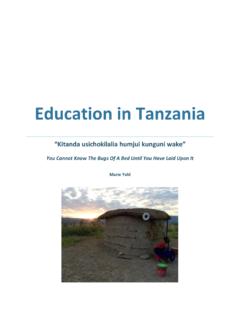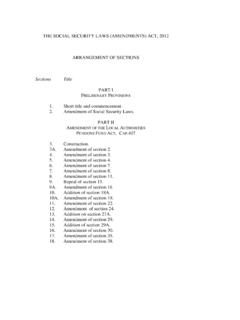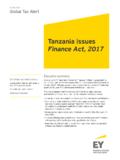Transcription of ASSOCIATION OF TANZANIAN EMPLOYERS (ATE)
1 1 ASSOCIATION OF TANZANIAN EMPLOYERS (ATE) ENHANCING SMES CONTRIBUTION TO EMPLOYMENT AND POVERTY REDUCTION WITHIN NATIONAL POVERTY REDUCTION STRATEGY POSITION PAPER ON ENHANCING SME S ACCESS TO GOVERNMENT PROCUREMENT AND FOOD STANDARDS PRESENTED AT THE STAKEHOLDER WORKSHOP, REGENCY PARK HOTEL, DAR ES SALAAM, 30TH SEPTEMBER 2005 Prepared by: Dr. Donath R. Olomi, University of Dar es Salaam Entrepreneurship Centre (UDEC) October 2005 i TABLE OF CONTENTS List of EXECUTIVE iii 1. Background ..1 Situation of the SME sector in Tanzania ..1 SME Development and Poverty Reduction Endeavours ..2 Objectives of this paper ..2 Methodology ..3 Organisation of the report ..3 2. ISSUES AND CONSTRAINTS TO GOVERNMENT Key areas of government procurement potential.
2 3 Current situation of the procurement regime in Tanzania ..4 Issues and limitations of the current legislation and its administration ..6 3. STANDARDS AND SME ACCESS TO Role of standards in accessing markets ..8 Key areas where standards have big potential for influencing access to markets9 Current situation with regard to standards and their impacts to Role of the two agencies not quite clear ..11 4. CONCLUSIONS AND Recommended Improvements in government procurement and process that is SME Recommendations for advocacy for better administration of WAY Annex 1: Stakeholder Workshop ii List of Abbreviations WB The World Bank ATE ASSOCIATION of TANZANIAN EMPLOYERS CSO Civil Society Organisations EADB East African Development Bank EU European Union FCC Fair Competition Commission MIT Ministry of Industry and Trade MOF Ministry of Finance MSE(s) Micro and Small Enterprise(s) MSME(s)
3 Micro Small and Medium Enterprises MYLD Ministry of Labour and Youth Development MVIWATA Muungano wa Vikundi vya Wakulima Tanzania NCC National Construction Council NGO Non-Governmental Organisation NSGRP National Strategy for Growth and Reduction of Poverty PRSP Poverty Reduction Strategy Paper PSO Private Sector Organisations R&D Research and Development SIDO Small Industries Development Organisation SME(s) Small and Medium Enterprise (s) TAFOPA Tanzania Food Processors ASSOCIATION TBC Tanzania Business Council TBS Tanzania Bureau of Standards TCCIA Tanzania Chamber Of Commerce, Industry and Agriculture TFDA Tanzania Food and Drug Authority TPSF Tanzania Private Sector Foundation TRA Tanzania Revenue Authority UDEC University of Dar Es Salaam Entrepreneurship Centre UDSM University of Dar Es Salaam UNIDO United Nations Industrial Development Organisation URT United Republic of Tanzania VIBINDO Jumuia ya Viwanda na Biashara Ndogondogo VPO Vice President s Office WTO World Trade Organisation PRS Poverty Reduction Strategy MKUKUTA Mkakati wa Kukuza Uchumi na Kuondoa Umaskini BEST Business Environment Strengthening for Tanzania PPRA Public Procurement Regulatory Authority PPAA Public Procurement Appeals
4 Authority iii EXECUTIVE SUMMARY Introduction The ASSOCIATION of Tanzania EMPLOYERS (ATE) has made a strategic decision of taking a more pro-active role in contributing to Small and Medium Enterprise (SME) development, as a way of furthering its mission of improving labour relations in the private sector. In 2004/05, the ASSOCIATION conducted a study of the influence of policies, laws and regulations on SMEs, with particular emphasis on effects on access to market, an issue known to influence quantity and quality of jobs in SMEs. This was conducted with support from the International Labour Organisation s Bureau for Employer s activities, under a project designed to enhance SMEs contribution to job creation and poverty within national poverty reduction strategy.
5 The study established that the public procurement and standards regulatory regimes are among the main issues hampering access to markets for SMEs. Subsequently a more in-depth study was conducted on these two issues. ATE and the ILO decided to share the results with other stakeholders for validation and also as part of a wider agenda of engaging them in a reform process. This document presents results of the study as well as the inputs from the stakeholders workshop. Approach The initial study was done mainly through a review of literature. Four policy fields judged to have the greatest potential for influencing SMEs access to markets were selected: finance, taxation, standards and trade.
6 The results suggested that areas with the greatest effect on performance of SMEs are related to access to government procurement and food standards. A deeper analysis was done in these areas through interviews with senior officials in the related regulatory bodies. Issues and constraints related to public procurement There are a lot of potentials for SMEs to sell to central and local government institutions. Access is most severely constrained in sub-sectors where there are also strong foreign companies. Recent reforms have seen the enactment of a new Public Procurement Act (PPA) 2004 and related regulations, establishing a Public Procurement Regulatory Authority (PPRA) a Public Procurement Appeals Authority (PPAA) and providing preferential treatment for local enterprises, most of which are SMEs.
7 The preferential treatment for include: exclusive preference for local companies for project ranging from Tshs 50 million 1 billion (depending on type of activity); margin of preference ivfor locally owned firms, ranging from 4% to 10% (depending on local participation); margin of preference for locally manufactured or mined goods of up to 15%; and splitting of contracts to make them accessible to local companies. Despite these efforts, SMEs may not benefit from these developments. Regulations and guidelines for PPA, 2004 are yet to be disseminated widely to the public. PPRA perceives that access to government procurement will be limited to fairly well established SMEs. For this reason, they communicate in English and then through the Internet and serious newspapers, avenues that reach a very small proportion of SMEs.
8 As a result, awareness of the provisions among central government, local government, public institutions, business associations and SMEs themselves is very low. Issues and constraints related to food standards The main laws regulating foods and drugs are Tanzania Food, Drug and Cosmetics Act, 20031and the Standards Act No 3 of 1975 (as amended by Act No 1 of 1977). The main standards related issues affecting SMEs access to markets are that (i) the Laws and their regulations are largely out of reach of most MSEs, (ii) Unclear role of the regulatory bodies, especially the Tanzania Bureau of Standards (iii) weaknesses in the administration of the two laws. The role of TBS is not quite clear in the minds of the public. Some consumers, retailers, institutional buyers and even SME operators believe that one is not allowed to sell any manufactured product without TBS certification.
9 In reality, TBD standards mark is voluntary. Even some senior official of TBS argue that it is illegal to manufacture and sell any product without TBS certification. There is a widespread ignorance of standards and regulations that have a strong bearing on market access. This is attributed to inadequate communication by TBS and TFDA. All materials are in English and centralized in their Dar es Salaam offices, meaning that they are inaccessible to those who cannot read documents written in English or those who operate outside Dar es Salaam. Their libraries do not keep easy to read and follow guidelines and procedures which would be useful to a small business operator. Although both TBS and TFDA provide very important services to enterprises, they only have offices in Dar es Salaam.
10 They are expected to function through Health Officers in all local governments throughout the country. However, rather than facilitate the process, some health officers are a hindrance as they charge MSEs exorbitant costs for travel and subsistence to send and collect samples for testing to Dar es Salaam. 1 (1_2003).pdf vConclusions and recommendations It is recommended that the PPRA adopts a more broad-based stance towards promoting local company s access to public procurement, taking into account that different types and sizes of enterprises can access public contracts. Documents and messages from PPRA, TBS and TFDA to the public should be designed and communicated in an easy to follow form, language and media.
